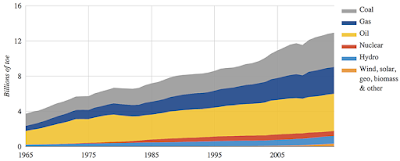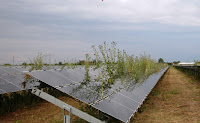By Physicist Denis G. Rancourt, PhD
I provide a proof that alternative energy production technologies (wind, solar, ocean energy, biofuels, etc.) necessarily burn more fossil fuel, per quantum of energy generated, than the energy production technologies that directly burn fossil fuel.
(Note: Hydro-electricity is “renewable” but it is not an “alternative” energy.)
If this were not the case, or if there was a realistic potential for this not to be the case, then alternatives could be more economical on a true-coast basis and would be experiencing a consequential surge in development and implementation, without disproportionate (per energy quantum) public investment.
Whereas, the global reality looks like this:
The increases in the insignificant alternatives are tied to disproportionate government investment, incentives, and subsidies, which transfer artificially high costs to citizens and users. As soon as government commitments are reduced or terminated the sector crashes [1].
Here is the said proof.
The true (no public subsidy) cost of any “alternative” is a fair proportional measure of the fossil-fuel expenditure needed to create and maintain the said “alternative”.
This is true because a large fraction of the said true cost is to buy the mechanical (machine) work to entirely manufacture and maintain the alternative technology.
The said mechanical work is needed for every aspect of the production, from mining and transporting ore (or raw material), to making materials from the ore, to making components from the materials, to assembly of the components, to computer design (having built the computers), to feeding and clothing and housing and transporting all the workers involved… (i.e. labour costs), to installing the technology, and to maintain the technology. Operational life-time and disaster installation-replacement must also be counted, as part of “maintenance”.
Maintenance costs are significant. Here are a few provocative pictures that illustrate the point:
The required said mechanical work is energized by the available energy sources. Since 87% or so of energy used, which powers all machine activity, is fossil fuel (not to mention hydro and nuclear), therefore the said mechanical work is mostly energized by burning fossil fuel.
Since the true cost of alternative energy produced is higher than the true cost of fossil fuel energy produced, since true cost is a measure of available energy consumed in producing the energy, and since available energy is mostly (87%) from fossil fuels, it follows that alternative technologies burn more fossil fuel than the fossil fuel technologies themselves, per quantum of energy produced.
This is not surprising since virtually all human-directed work performed on the planet (to build and maintain everything), beyond the small contribution of work directly from human and domestic-animal muscle power, is energized by conventional high-density energy sources. Every societal transformation imaginable, from growing food to building cities to transportation… uses concentrated and transportable energy.
Inescapably, alternatives burn more fossil fuel than conventional energy. This will be true until the high costs in energy for total-cycle manufacturing and maintaining of alternatives is paid for using energy produced by alternatives.
The above proof relies on the link between true cost and underlying full-process energy consumption. The said link is a reality. Without energy to perform work, raw resources are useless and do not become technology.
The above proof is compelling enough that anyone who alleges having found specific circumstances in which a particular alternative technology does not burn more fossil fuel than fossil fuel technology, per quantum of energy produced, should have the onus to prove the alleged exception resulting from the exceptional circumstances. That discovery and demonstration of principle will not need government subsidies.
(There is already an army of paid university professors who could put their minds to the said discovery and demonstration, if they believed it was useful to do so, rather than writing articles about projected liabilities from not putting their minds to this task.)
Endnotes
[1] E.g.: “UK solar power installations plummet after government cuts“,The Guardian, April 8, 2016; “EY report : Attractiveness of UK renewables plummets as government withdraws support earlier than expected“, EY.com, September 16, 2015.
Dr. Denis G. Rancourt is a former tenured and Full Professor of physics at the University of Ottawa, Canada. He practices various areas of science (environmental geochemistry, soil science, spectroscopy, condensed matter physics, materials science) which have been funded by a national agency, has published over 100 articles in leading scientific journals, (Research Gate profile), and has written several social commentary essays. He is the author of the bookHierarchy and Free Expression in the Fight Against Racism.





